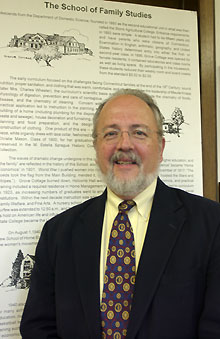|
This is an archived article.
For the latest news, go to the
Advance Homepage
For more archives, go to the Advance Archive/Search Page. | ||
|
Family Studies School Addresses The School of Family Studies, once on the brink of extinction, is alive and well and now boasts the largest number of undergraduates enrolled in a single major. That makes Charles Super, the school's dean, proud.
"Human development and family studies is a very appealing major to people who are interested in human services or social sciences," Super says. "They like the inter-disciplinary track. "Most of the issues the school deals with are very accessible and interesting to students," he says. "They're on the front page of the newspapers. They're family issues. They deal with an aging grandparent, the neighbor's children, or the crime rate in their home towns." Super has presided over the School since 1996. He is also now director of the Division of Health and Human Development, an administrative collaboration among the schools of family studies, allied health, nursing, and pharmacy. He came from Pennsylvania State University, where he was a professor in the human development and family studies department and was its head for three years. He holds a B.A. in psychology from Yale and a Ph.D. in developmental psychology from Harvard. "The school was founded in 1893 as the department of domestic science to deal with the challenges facing Connecticut families at the end of the 19th century," Super says. "Most of the families were farmers and industrial workers and the issues were about feeding the family and keeping them warm in winter. Pasteur and germ theory were hot stuff." Today, families are dealing with a different set of issues, Super says. "The concept of the nuclear family has changed. Family violence is a big problem. Early childhood education is an issue, as is family mobility and lack of community support for new families. And as the lifespan increases, we have to deal with new problems of an aging America." The use of time has changed dramatically, Super says. "Half of American meals are eaten outside of the home. What's happened to the family dinner? How does that affect the opportunities that parents and kids have? Plenty of families stop by McDonald's on the way to soccer practice or between shifts in jobs. Mothers have full time jobs." These topics and more are covered in the school's curriculum, Super says. The School's faculty members span a wide range of expertise. A mixture of social and behavioral scientists and practitioners, they include sociologists, psychologists, anthropologists, and policy experts. "Their range of expertise enables us to give students different perspectives on modern American families, and a broad understanding of developmental changes over the life span," says Super, who studies early infancy and cultural organization of development. "Intellectually, it makes it very interesting to have a large playing field and be able to draw on the observational traditions of anthropology and the experimental traditions of psychology." There are 17 tenure-track faculty and more than that number of adjuncts. "For a small school," he says, "it's a little bit bold to take on such a breadth of topics, but it's that very breadth that allows us to tackle the complexities seriously." For example, he says, "you can't understand the modern family unless you have some appreciation for the diversity of family traditions that Americans have coming from Europe, Africa, and Asia. That affects the way you think about the education of your child, for example, and what you feel you should be doing as a mother or father. Everything is connected." Undergraduates can focus on early childhood development and education; childhood and adolescence; family relationships: services and counseling; family and society; social policy and planning; or adult development and aging. Graduate students may earn master's and doctoral degrees in human development and family studies. Nationally accredited clinical training is offered in marriage and family therapy at both levels. Many of the students who earn bachelor's degrees find positions in human services. They are teachers in preschools, child advocates, foster care workers, rehabilitation counselors, community education specialists, youth services coordinators, and court liaisons. Others go on to graduate school, often in sociology or social work. About half the graduate students go into academia, while others find leadership positions in social service agencies. Jobs in the field all deal with relationships, Super says "relationship s among people, and how individuals work within small groups, and how small groups relate to systems." Super says in addition to theoretical research, applied work and outreach are important. "We explore better ways to handle foster care, plan housing for the elderly, design preschool programs, or evaluate drop-in centers for adolescents and school readiness programs," he says. The variety of research conducted by faculty and graduate students runs the gamut from cultural issues, school and family relationships, and infancy and early behaviors, to styles of coping with cancer, evaluation studies for foster care, and policies for the aging in an international context. "It's always about individual development, relationship development, and family systems," Super says. "It's a complicated bundle, but it's very cohesive." As is the case for much of the University, Super says, his biggest constraint is resources. "By some measures we should quadruple the size of our faculty, but that's not going to happen right away. So we're looking at external sources of funding and more efficient ways to teach." As he looks toward the future, Super expects the School will continue to integrate public policy with developmental work, and the understanding of family systems with that of educational and legal systems: "These are areas that are only going to become more important as we globalize." This article is one in an occasional series about the University's academic and other administrators. |

